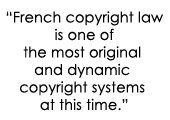 I am happy to announce the release of my book Guide to Copyright in France – Business, Internet and Litigation.
I am happy to announce the release of my book Guide to Copyright in France – Business, Internet and Litigation.
French copyright law is one of the most original and dynamic copyright systems at this time. This book is a practical and straightforward guide to how copyright works in France: protection, ownership, assignment agreements, collective management, and litigation. This guide is divided into six chapters (see table of contents):
Chapter 1 ‘Subsistence of Copyright and Neighbouring Rights’ explains the conditions of protection of works such as photographs, audiovisual works, architecture, conceptual art, computer programmes, videogames, databases, etc. and the conditions of protection of neighbouring rights’ subject matters (including phonograms, databases and sporting events).
 Chapter 2, ‘Ownership’ analyses the rules relating to authorship and automatic assignments. The French copyright system is progressively less protective of the initial author, and provides for automatic assignments in many situations such as: the creation of computer programmes by employees, the creation of audiovisual works and adverts, the works made by journalists and civil servants, and the digital exploitation of unavailable books. Moreover, the French copyright system provides for presumption of ownership in certain cases.
Chapter 2, ‘Ownership’ analyses the rules relating to authorship and automatic assignments. The French copyright system is progressively less protective of the initial author, and provides for automatic assignments in many situations such as: the creation of computer programmes by employees, the creation of audiovisual works and adverts, the works made by journalists and civil servants, and the digital exploitation of unavailable books. Moreover, the French copyright system provides for presumption of ownership in certain cases.
Chapter 3 ‘Moral Rights’ and Chapter 4 ‘Economic Rights’ present all the rights granted to the rightholders. It is exceedingly important to understand these rules in a system where courts apply national provisions to almost any international situation (in particular in application of Article 5(2) of the Berne Convention: see my earlier blogpost ‘French Supreme Court on 5(2) BC: national law determines who is the copyright owner’).
Chapter 5 ‘Exploitation and Contracts’ presents the rules and practical aspects of copyright and neighbouring rights from the perspective of contracts, collective management and business practices. In particular in the fields of music, television and cinema, there are many examples of model agreements and clauses with technical explanations.
Chapter 6 ‘Litigation’ finally shows how litigation in France works, and again in a practical way. The developments include: evidence gathering, summary and normal proceedings before the courts, infringement seizure, customs detention, evidence securing on the Internet, jurisdiction, applicable law, remedies and prevention of infringements on the Internet (unlawful downloading and streaming, liability of Internet users, ISPs and hosting providers).
Useful specialised French-English and English-French dictionaries are included. The book is destined not only to be used by lawyers, businesses and public authorities, but also by academics and anyone who needs to understand French copyright law.
BS
Guide To Copyright in France. Business, Internet and Litigation, by: Brad Spitz, November 2014, ISBN 9041152873, ISBN 13: 9789041152879, 272 pp. hardcover.
________________________
To make sure you do not miss out on regular updates from the Kluwer Copyright Blog, please subscribe here.


